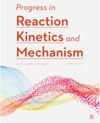Ab initio study of mechanism of forming a Si-heterocyclic spiro-Sn-heterocyclic ring compound by cycloaddition reaction of Me2Si=Sn: and ethene
IF 2.1
4区 化学
Q3 CHEMISTRY, PHYSICAL
引用次数: 0
Abstract
X2Si=Sn: (X = H, Me, F, Cl, Br, Ph, Ar, etc.) are a new chemical species. The cycloaddition reactions of X2Si=Sn: are a new field of stannylene chemistry. The mechanism of the cycloaddition reaction between singlet state Me2Si=Sn: and ethene has been investigated for the first time here using second-order Møller-Plesset perturbation theory together with the 6-311++G** basis set for C, H and Si atoms and the LanL2dz basis set for Sn atoms. From the potential energy profile, it could be predicted that the reaction has one dominant reaction channel. The reaction process presented is that the 5p unoccupied orbital of Sn in Me2Si=Sn: and the π orbital of ethene form a π → p donor–acceptor bond resulting in the formation of an intermediate. The instability of this intermediate makes it isomerize to a four-membered Si-heterocyclic ring stannylene. Because the 5p unoccupied orbital of the Sn atom in the four-membered Si-heterocyclic ring stannylene and the π orbital of ethene form a π → p donor–acceptor bond, the four-membered Si-heterocyclic ring stannylene further combines with ethene to form another intermediate. Because the Sn atom in this intermediate assumes sp3 hybridization after the transition state, the intermediate isomerizes to a Si-heterocyclic spiro-Sn-heterocyclic ring compound. This result indicates the modes of cycloaddition reactions between X2Si=Sn: and symmetric π-bonded compounds, i.e. this study opens up a new field for stannylene chemistry.Me2Si=Sn:与乙烯的环加成反应生成si - spro -Sn-杂环化合物机理的从头算研究
X2Si=Sn:(X = H, Me, F, Cl, Br, Ph, Ar等)是一种新的化学物质。X2Si=Sn的环加成反应是锡炔化学研究的一个新领域。本文首次利用二阶Møller-Plesset微扰理论,结合C、H、Si原子的6-311++G**基集和Sn原子的LanL2dz基集,研究了单重态Me2Si=Sn:与乙烯之间的环加成反应机理。从势能分布可以预测该反应有一个主导反应通道。给出了Me2Si中Sn的5p未占据轨道=Sn:与乙烯的π轨道形成π→p给体-受体键形成中间产物的反应过程。该中间体的不稳定性使其异构化成四元硅杂环锡炔。由于四元硅杂环锡炔中Sn原子的5p未占据轨道与乙烯的π轨道形成π→p给体-受体键,四元硅杂环锡炔进一步与乙烯结合形成另一中间体。由于中间体中的Sn原子在过渡态后呈sp3杂化,因此中间体异构为si - spro -Sn-杂环化合物。这一结果揭示了X2Si=Sn:与对称π键化合物之间的环加成反应模式,为锡炔化学开辟了新的研究领域。
本文章由计算机程序翻译,如有差异,请以英文原文为准。
求助全文
约1分钟内获得全文
求助全文
来源期刊
CiteScore
2.10
自引率
0.00%
发文量
5
审稿时长
2.3 months
期刊介绍:
The journal covers the fields of kinetics and mechanisms of chemical processes in the gas phase and solution of both simple and complex systems.

 求助内容:
求助内容: 应助结果提醒方式:
应助结果提醒方式:


